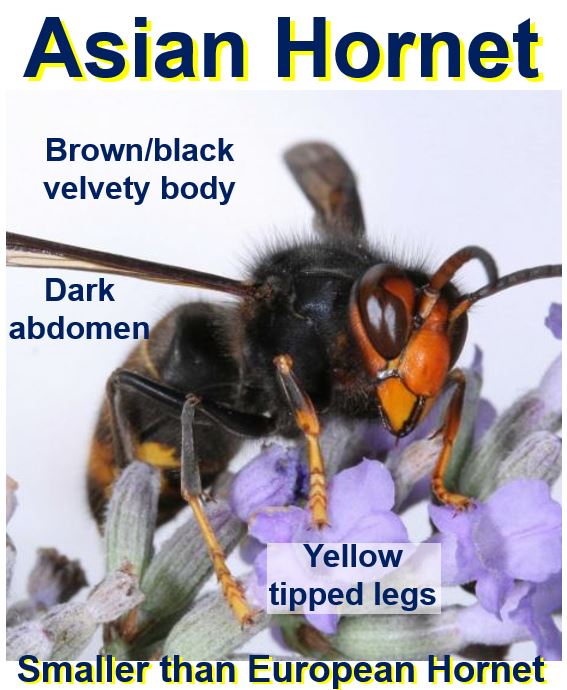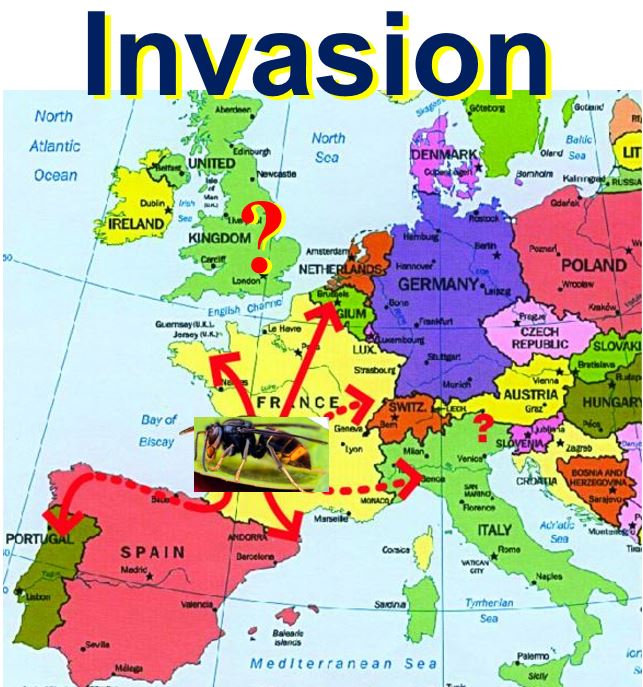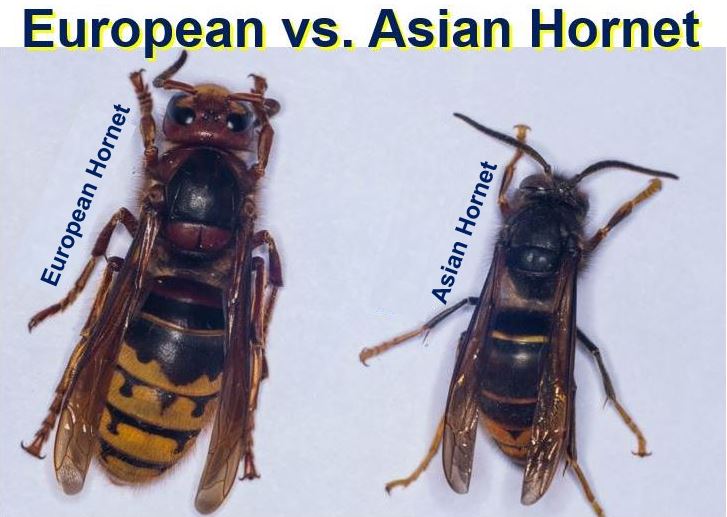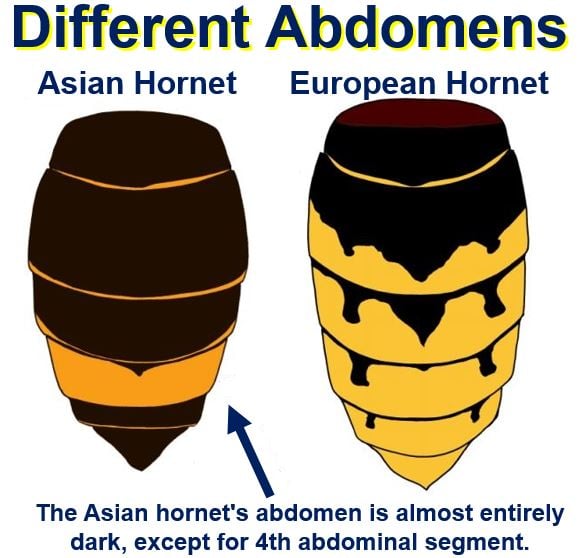Asian hornets (Vespa velutina), insects that kill and devour up to fifty honeybees each per day, are likely to be invading Great Britain soon, after arriving in France twelve years ago and spreading rapidly across Europe – all the way to southern Portugal. They pose a serious threat to European honeybee populations.
The Asian hornet, which is considerably more aggressive than its British cousin, got into France hidden in a shipment of Chinese pottery in 2004. Entomologists (insect experts) say it is just a question of time before Vespa velutina reaches our shores and starts spreading across the country.
 The Asian Hornet, also known as the Yellow-legged Hornet, usually nests high in trees and man-made structures, sometimes closer to the ground. It hunts honeybees, other insects, and also feeds on fruit and flowers. (Image: nonnativespecies.org. Downloads as PDF)
The Asian Hornet, also known as the Yellow-legged Hornet, usually nests high in trees and man-made structures, sometimes closer to the ground. It hunts honeybees, other insects, and also feeds on fruit and flowers. (Image: nonnativespecies.org. Downloads as PDF)
Difference between wasps, hornets and bees
What’s the difference between a wasp and a hornet? According to South Ribble Borough Council:
1. Wasps have little or no hair, they are bright yellow and black, aggressive in nature, do not swarm, and sting readily and repeatedly. They eat insects, sugary drinks and food waste.
2. Hornets have some hair (less fur than bees), they are chestnut brown and yellow, they do not swarm, only sting when provoked, and can bite and sting at the same time. They eat mainly insects, and also fruit and flowers.
3. Bees are very furry, their colours depend on which type, for example the honeybee is black or brown intermixed with amber, they have a gentle-nature, and only sting once (die after stinging). They eat nectar from flowers.
 Not currently present in the UK, the Asian Hornet was introduced to France 12 years ago and has rapidly extended its range. There is a high possibility it will make its way into the UK through soil associated with imported fruit, cut flowers, plants, garden items (furniture, plant pots), freight containers, and untreated timber. Experts say it is unlikely to fly across the Channel, but have not ruled out that possibility. (Image: vita-europe.com)
Not currently present in the UK, the Asian Hornet was introduced to France 12 years ago and has rapidly extended its range. There is a high possibility it will make its way into the UK through soil associated with imported fruit, cut flowers, plants, garden items (furniture, plant pots), freight containers, and untreated timber. Experts say it is unlikely to fly across the Channel, but have not ruled out that possibility. (Image: vita-europe.com)
EU trying to stop invasive species spread
Tough new European Union controls, which came into force at the beginning of this year, aim to halt the spread of thirty-seven invasive species. While this is a good move, experts say, the scale of the problem is colossal.
We are now in Invasive Species Week, which aims to teach the public about the devastation that invasive non-native species (INNS) can cause, and what can be done to help.
According to the Wildlife and Countryside Link, INNS cost the UK over £1.7 billion annually to control. Out of about two thousand non-native species currently in the United Kingdom, more than 300 are invasive, with the number of new INNS growing each year.
Invasive species and bird extinctions
Over the past couple of centuries, INNS have been the main culprits regarding several bird extinctions. In fact, about half of all bird extinctions worldwide since 1500 have been due to INNS.
Camilla Keane, Chair of the Wildlife and Countryside Link’s Invasives group, said regarding the looming Asian hornet threat:
“Like all invasive non-native species, once established the Asian hornet would be incredibly difficult and hugely costly to tackle.”
“While we recognise the UK Government played an important role in developing the EU Invasive Alien Species Regulation as well as the list of 37 species of EU concern, during Invasive Species Week, we are calling on the Government in England to work with devolved administrations to develop a list of invasive alien species of UK-wide concern as set out in the EU IAS Regulation.”
“This would support collaborative working across the EU and help prevent species like the Asian hornet reaching our shores.”
 The Asian Hornet is smaller than its European cousin. Unlike the European hornet, the Asian hornet is a day-flying species which ceases activity at dusk. (Image: i.dawn.com)
The Asian Hornet is smaller than its European cousin. Unlike the European hornet, the Asian hornet is a day-flying species which ceases activity at dusk. (Image: i.dawn.com)
Asian hornet is a honeybee predator
Europe’s honeybee population has experienced an alarming decline over the past couple of decades. The last thing honeybees in the UK need are their worst nightmare becoming reality – an invasion of Asian hornets.
Asian hornets eat honeybees and other pollinators in huge quantities. Like other INNS, they cause considerable environmental and economic damage.
From a single nest in a pottery shipment from China to France in 2004, the Asian hornet has spread to Belgium, Italy and Portugal.
 The Asian hornet is a highly aggressive predator of native insects. It poses a significant threat to honeybees and other pollinators. (Image: nonnativespecies.org)
The Asian hornet is a highly aggressive predator of native insects. It poses a significant threat to honeybees and other pollinators. (Image: nonnativespecies.org)
Although it has not yet reached the UK, the Asian hornet is spreading rapidly across the Europe, and it is most probably just a matter of time before the invasion starts. It will likely come into the UK hidden in imported cut flowers, timber, pot plants or fruit.
The Asian hornet is smaller than the native European hornet (Vespa crabro). It has an almost entirely dark abdomen and yellow ends to its legs.
Asian hornet not a threat to human life
This Asian hornet should not be confused with the larger and more aggressive Giant Asian hornet (Vespa mandarinia), which has been known to have a fatal sting (kills people).
 Apart from the difference in size, the European and Asian hornets have different abdomen colourings. (Image: nonnativespecies.org)
Apart from the difference in size, the European and Asian hornets have different abdomen colourings. (Image: nonnativespecies.org)
While not a threat to human life, the Asian hornet is a major killer of honeybees and other pollinators. If you think you saw one, you should immediately report the sighting to the UK Biological Records Centre.
Ms. Keane said:
“Sadly many other invasive species already wreak havoc in our countryside, and new invasive non-native species are arriving each year, so the issue is not going away. However, there is a lot people can do to help combat the problem.”
“From not growing particular plants in your garden, composting garden waste wisely, to cleaning down your equipment after fishing or boating. There are a number of small steps like this that can dramatically reduce the spread of INNS.”
There will be several events and workshops taking place across the country during this Invasive Species Week.
As well as seeking ways countries can work together to combat INNS reaching our shores, there will be a major drive to stop the spread of aquatic INNS in our lakes, rivers, canals and streams, which is an enormous problem.
The ‘Check, Clean, Dry’ campaign encourages individuals who use waterways – from anglers to boat users – to thoroughly clean their equipment. By doing so, they would be helping stop the spread of several invasive species. There will also be advice for gardening enthusiasts and what plants they should avoid.
Video – Asian Hornet invasion threatens European honeybees
Dr. Max Watkins, Technical Director of Vita (Europe) Ltd, talks about the spread of Asian hornets and the threat they pose to honeybees in a growing number of countries in Europe.
Discover more from Market Business News
Subscribe to get the latest posts sent to your email.

